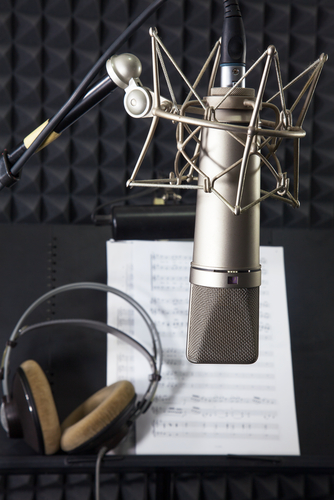 Nothing leaves your vocal calling card like an album. People expect that you will sound your best on a recording and they will judge your voice from what they hear, so you want to make sure you produce your best work.
Nothing leaves your vocal calling card like an album. People expect that you will sound your best on a recording and they will judge your voice from what they hear, so you want to make sure you produce your best work.
However the sterile environment of a recording studio and the pressure of recording an awesome vocal in a short space of time can really throw you off your game, so before you fork out the big bucks on recording, here are four tips that will help you record a killer vocal every time.
1. Practice singing in a studio environment beforehand
You spend countless hours practice your singing before you hit the stage, you also spend a fair bit of time working on your stage craft to make sure you know what to say in between songs and how to get a reaction out of the audience. So why should singing in a studio environment be any different?
In fact, I’d say it’s more important because when you are in the studio the aim is to achieve more in a shorter period of time because time is money when you step into that booth. So, if you want to record a killer vocal then do your practice first.
I’m not just talking about practicing the songs you want to record; that should be a given. I’m referring to practicing singing with headphones on, singing in front of a pop filter and singing in one spot.
Just having headphones on can really throw you off your game because it alters the way you hear your voice and if you’re not used to it, it can affect how well you sing on the day. The same goes for singing in front of a pop filter; it changes how things sound to you and you can feel the heat from your breath on the filter and the closeness of the filter in front of your face. Practicing in this environment, as well as singing in one spot with less movement will help you sing more naturally when you do hit the studio.
2. Relax and enjoy it
When you’re on stage performing, you’re getting into the music, you’re relaxed and having fun and you’ve got stimuli coming at you from all angles. However when you’re singing in the studio it’s a dry environment without the interaction from the band or the audience and as a result your vocals can come out sounding emotionless and flat.
Nothing sucks the life out of the recording as much as a singer who is trying to record a pitch perfect vocal for every take, so just relax, pretend you’re on stage, ignore the mic in front of you and the sterile feel of the environment and visualize yourself performing or get into the meaning of the song and focus on that, not on your pitch or how long you’re holding your notes for. Your voice knows what to do, so get your brain out of the way and let your emotions take over and your voice will do its thing.
3. Don’t be afraid to change the recording date
As a singer you are a living, breathing instrument and this means your body will have its off days. Don’t be afraid to call the studio (even on the day) and shift the recording date or time if you need to.
Obviously you don’t want to make a habit of doing this because the studio is trying to run a business and you want to be professional, but if you’re slapping down the dollars to produce a killer sounding album then don’t waste your money by going ahead with a vocal recording session if you know you’re not going to be able to perform at your best. You’ll only end up wanting to re-record, which will cost you more cash.
4. Prepare your voice before the big day
Whenever I’m doing an important gig or I have a recording session coming up I start preparing my voice a good week before the actual day. A decent warm up the-day-of is not going to get your voice performing at its best.
Instead make sure you are singing regularly at least a week before the recording date. This keeps the muscles that support your voice supple and ‘in shape’ for a recording session. During this time you want to be focusing on pitch perfecting exercises because even the best singers can develop vocal muscle memory which causes them to land flat on some notes without realizing it. Then record and listen back to yourself singing your songs to make sure this isn’t happening.
You also want to start steaming in the days leading up to the recording session, steam on the day as well and increase your water intake substantially. Hydration is imperative for recording a good vocal and just drinking during the session itself won’t give your body enough time to top up its fluid levels if you started off in a dehydrated state.
Peppermint tea is also especially beneficial for reducing phlegm and mucous and if you are prone these things then also consider decreasing your dairy intake a good week before you are due to record.
—
Author bio: Nicola Milan is a professional singer, songwriter, recording artist and vocal coach. She publishes singing, stage craft and songwriting tips for singers on her website Singer’s Secret. Get her free 3-part singing training series here: www.singerssecret.com/free.
[hana-code-insert name=’newsletter-get-music-promotion’ /]
[hana-code-insert name=’Facebook-Event-Musician’ /]
[Mic picture from Shutterstock.]